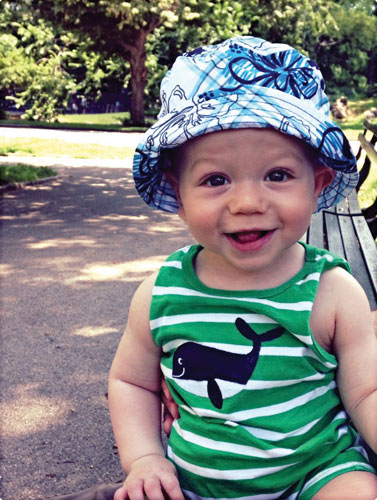.jpg)
.jpg)
In many ways, Idan Zablocki is a typical one-year old, with a happy-go-lucky nature, an intense curiosity about the world around him, and an enthusiastic readiness for playtime. But Idan is also one of two in a million, because he is struggling with Hyper IgM Syndrome, an extremely rare and life-threatening primary immune deficiency disorder that severely compromises his ability to withstand typical germs and viruses. That quickly rules out daycare, play dates with friends, and even time with his cousins, all of which are now life-threatening to him.
Idan’s parents, Amanda and Akiva Zablocki, of Manhattan’s Upper West Side, say that for the first eight months of his life, Idan was perfectly healthy. “He even surpassed typical growth milestones,” said his father proudly. But in April of this year, Idan began experiencing irregular breathing and so began a medical mystery that took weeks and a series of tests for doctors at New York-Presbyterian/Weill Cornell Medical Center—where Idan was born only months earlier—to solve when they diagnosed Idan with Hyper IgM.
With numerous action-oriented doctors and lawyers in the extended Zablocki clan, (Amanda is a corporate litigator, while Akiva, who holds a Master’s in Public Health, became a stay-at-home dad to care for Idan), the family on both sides quickly rallied and launched an extensive, thorough research campaign into the best options. They sought the counsel of the few experts in the field and learned that Idan’s best option for a cure is a bone marrow transplant, a risky procedure that carries a 10-15% chance of mortality.
A stem cell match was easily found for Idan, but the journey ahead is daunting.
It’s a journey that Akiva, a former IDF soldier who was raised in Israel, sees from a unique perspective. As a 25-year-old Columbia student, he was diagnosed with a life-threatening brainstem tumor. Akiva was forced to navigate the maze of medical jargon and back-to-back doctor appointments to negotiate the best course of action for his treatment. The experience left him with a healthy dose of optimism and renewed zest for life, the only visible aftereffects of the surgery a slight droop on the right side of his face and the eye patch he wears to prevent double vision.
After his surgery, Akiva returned to Columbia and continued nursing a serious crush, from afar, on Amanda, whom he had first took note of when he arrived on campus. In their senior year, a pre-arranged blind date by Akiva’s friends finally took place (“It was only half-blind for me, because I already had the eye patch,” he explains wryly, his sense of humor clearly intact), and Amanda fell in love with him at first sight. Akiva waited seven months into the relationship to tell Amanda for him, that love at first sight happened four years earlier. The couple dated for two years before Akiva proposed during Amanda’s first trip to Israel in December 2008 to meet his parents.
Akiva, now 33, and Amanda, 28, just celebrated their fourth wedding anniversary, recently weeks after Idan’s first birthday. They’ve just arrived home after visiting different cities across the U.S. to search for the optimal place for Idan’s surgery and the intense six months of aftercare. They chose Seattle Children’s Hospital, where Hyper IgM was first discovered and the bone marrow transplant invented.
The Zablockis keep family, friends and an extended circle of well-wishers updated on Idan’s battle through social media, and organized a fundraising page to help cover the cost of Idan’s treatment and transplant, much of which is not covered by Amanda’s insurance. The estimated total cost of surgery and aftercare is about $1 million, and Akiva and Amanda will be responsible for up to $500,000. Amanda will be taking an unpaid leave of absence to go to Seattle, and the Zablockis will use COBRA, paying the premiums out-of-pocket.
Both Akiva and Amanda express a deep and enduring gratitude to well-wishers for the outpouring of love and support they’ve so far received from all over the world.
“When we first got a diagnosis for Idan, it felt a little like we were headed into this great battle, and I knew we would need all the resources we could get,” Amanda said. “Seeing the outpouring of love and support that we’ve gotten from all over the world makes us feel like we really have an army behind us. The words, e-mails and random acts of kindness give us strength throughout this difficult journey and empower us to soldier on.”
As traditional Jews, they find spiritual comfort in the prayers being said for them that cross religious divides. “There are shuls that are praying for us, and there are churches and Muslim friends and acquaintances who are also keeping us in their prayers,” says Akiva. “The support for what we are going through is non-denominational, and it’s beautiful to see.”
The family looks forward to good times following the transplant, and the months of treatment and vaccinations that Idan will face. Amanda cannot wait for Idan to be able to play with his cousins again.
And Akiva? “Right before Idan got sick, it was the first nice day of spring, Idan’s first spring ever. I took him to park to play in the swing. His face was so joyful,” he said, his voice cracking. “I want him to go on a swing in a park, and I want to see that look on his face again.”
To make a donation, please visit the Zablockis’ fundraising page at (http://www.youcaring.com/medical-fundraiser/help-fight-for-idan/63532) and follow Idan’s treatment and recovery on Facebook at (https://www.facebook.com/HelpFight4Idan) .
By Tova Ross










